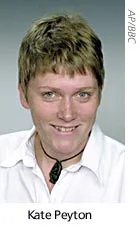New York, February 9, 2005—The Committee to Protect Journalists is deeply saddened by the death of BBC producer Kate Peyton, who was shot today outside her hotel in the Somali capital, Mogadishu. Peyton underwent surgery at a local hospital but died later of internal bleeding, according to the BBC.
Details were sketchy, but news reports said Peyton was shot outside the Sahafi Hotel, where she had arrived just hours earlier to begin a series of reports on the strife-torn country. Several foreign reporters are based at the hotel, which is heavily guarded, according to CPJ sources. Initial reports conflicted as to whether there was one assailant or more.
Agence France-Presse quoted witnesses as saying that assailants targeted Peyton before speeding off in a white sedan. The vehicle was later found abandoned in a central Mogadishu neighborhood, Mohammed Warsame Doleh, the acting police chief, told AFP.
The BBC said Peyton had spent the last 10 years in Africa and was based in Johannesburg. She had worked for the BBC since 1993 and had also worked as a producer and trainer for the South African Broadcasting Corporation in Johannesburg. The BBC said she would be greatly missed.
“We mourn the loss of our colleague Kate Peyton and condemn this reprehensible attack on an innocent person who was trying to report on an important international issue,” CPJ Executive Director Ann Cooper said. “We call on authorities and the newly elected federal government to ensure that Peyton’s killers are swiftly found and brought to justice.”
Peyton, 39, had arrived in Mogadishu earlier Wednesday with BBC reporter Peter Greste, according to the BBC. Foreign reporters have recently returned to Mogadishu, where a transitional reconciliation government may be installed. Somali officials are in Mogadishu assessing conditions for the government, elected last year by a peace conference in neighboring Kenya, to return to Somalia.
Violence and lawlessness are rife in Somalia, which has had no effective central government since the fall of dictator Siad Barre in 1991.
![]()
